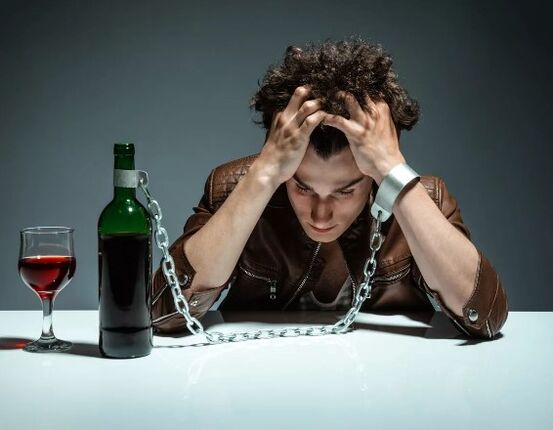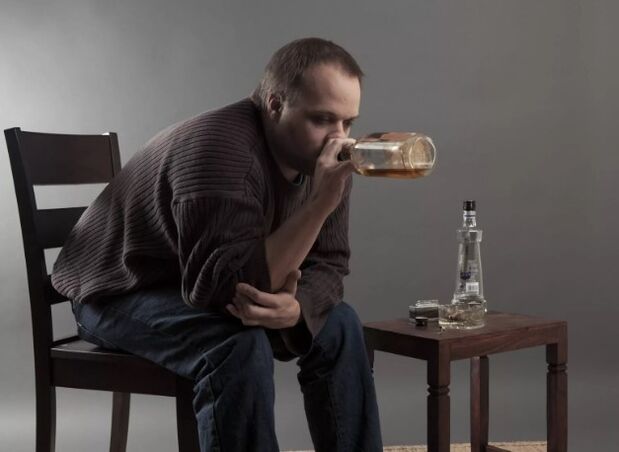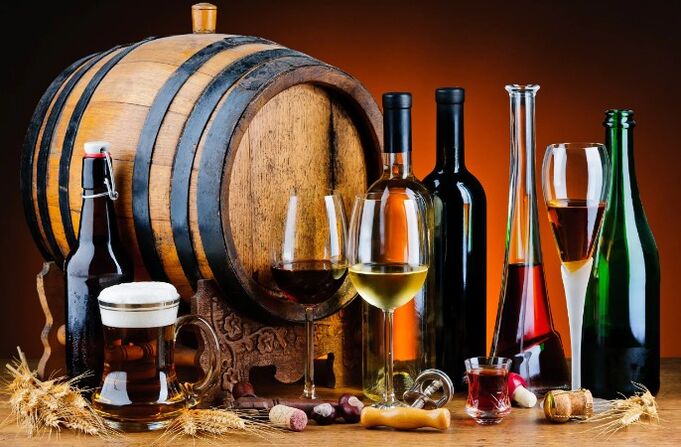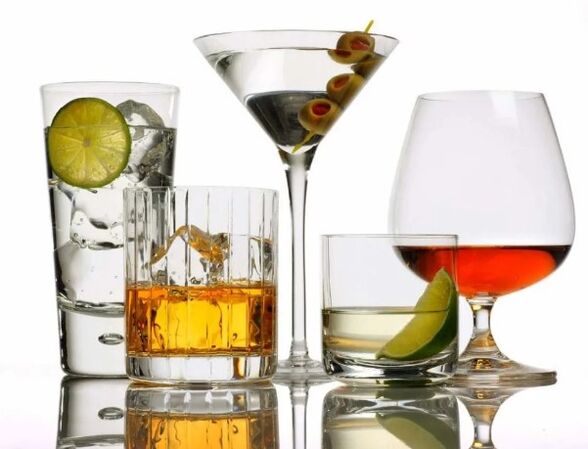Alcoholism is one of the most difficult problems in modern society.Alcohol and its effects on the body are the subject of discussion among scientists from different specialties, who try to find out the reasons for the rapid increase in incidence, ways to get people out of this condition, and risk factors for developing a tendency to drink regularly.

First, alcohol-induced changes in internal organs do not manifest as dramatic disruptions in function.But over time, the effects of alcohol on people increase, causing acute disturbances in the activity of important systems of the body and disrupting the complex chain of mechanisms of its neurohumoral regulation.
Mechanism of action characteristics
What effects does alcohol have on the body?Once in a person's stomach, alcohol is absorbed into the bloodstream almost immediately.Few people know that alcoholic drinks begin to break down in the mouth, so that the blood is filled with alcohol from the first minutes of contact with the body.From this moment on, the harmful effects of alcohol on human organs begin.Approximately 20% of alcohol is neutralized by the liver enzyme alcohol dehydrogenase, thereby inactivating substances containing alcohol toxins.
Most of the alcohol continues to work its way through the small intestine.It is from here that alcohol penetrates into all aqueous areas of the body, is partially excreted through sweat, urine, saliva, etc., where it is partially oxidized and accumulates in most organs within a few days.During this period, alcohol is like a poison, slowly poisoning all cells in the body, affecting human development, psychological state, and the function of internal structures.
Effects of alcohol on systems and organs
The harm of alcohol to the human body is not only reflected in the dysfunction of the brain and liver.Alcohol abuse has negative effects on all organs and systems of the human body.In short, regular consumption of alcoholic beverages completely disrupts the patient's body's normal functional patterns, adversely affects its overall functionality, and is one of the leading causes of death among people of working age.
psychological impact
Perhaps each of us knows how alcohol affects the human psyche.Alcoholics may experience hallucinations, extreme anxiety, apathy, and chronic feelings of depression.Alcoholics have completely lost themselves.These people become unsociable, pay little attention to their appearance, they no longer worry about daily human worries, no longer care about their families, etc.

Consequences of drinking alcohol on the human body
Each stage of addiction has certain symptoms and unique characteristics.There are 4 in total.
For the initial stageIt is characterized by a gradual increase in the amount of alcohol consumed, the development of dependence and the impact of alcohol on the psychological level.
second stageThere is a desire to increase the dose of alcohol.Addiction develops on a physical level.
third time- Destruction on the physical and psycho-emotional level, the development of dementia.
Stage 4 is untreatable and leads to death of the addict.Body systems fail and death occurs.
25 reasons to quit drinking
Many people think there is nothing wrong with drinking alcohol on evenings, weekends, or holidays.But few people have a sense of proportion and willpower.Seemingly harmless hobbies can turn into bad habits.This article provides 25 reasons to quit drinking and discusses the dangers of alcohol and its effects on the human body.
- Alcohol is the root of much disease, meanness, indiscipline, wasted talent, senseless conflict and poverty.
- It is difficult to find a greater evil than alcohol, which disrupts the health of millions of people so persistently and relentlessly, so violently destroys all the tissues and organs of the human body (especially the cerebral cortex), a man's psyche and personality, and ultimately leads to his untimely death.The insidious thing about this poison is that the serious consequences of alcohol's harm don't happen immediately, gradually, and imperceptibly.
- The impact of alcohol on people's lives can be proven by the following facts: 50% of accidents, 1/3 of suicides, and 80% of oral and esophageal cancer deaths are caused by alcohol abuse.
- Australian scientists have concluded that the brains of both heavy drinkers and moderate drinkers gradually decline and shrink, according to research using the latest technology.One alcoholic drink can damage 1000-2000 cells in our brain.These data were confirmed in 95% of heavy drinkers and 85% of moderate drinkers.
- Studies have proven that drinkers are 15 times less likely to give birth to healthy children than non-drinkers, and their children are 5 times more likely to die and 3.5 times more likely to have morbidity (note, we are only talking about drinkers, not alcoholics).Alcohol affects children even before they are born.Even in families where alcohol is moderate, children are born with slow development, underdeveloped intelligence, or even death.Thousands of premature babies are born every day to women in the United States alone due to alcohol and drug abuse.Alcoholic parents are the worst thieves who steal from their children the blessings of a future discovery of a happy, fulfilling life (according to F.G. Uglov).
- Experiments on eggs revealed: 160 eggs were placed in an incubator in a barn to brew alcohol in its basement.The alcohol vapor affected the eggs.When the time came, the result was: only half of the chicks hatched, 40 of them could not survive, and 25 were mutants (no beaks, no claws, etc.).
- If one person's genetic code is compromised, an entire generation is at risk.Today, 96% of genetic code violations are caused by various drugs (alcohol, cigarettes, other drugs).
- Alcohol as a drug, in any form and at any dose, is harmful to the human body because it acts like morphine or marijuana, that is, it causes the illusion of goodness and happiness while causing irreparable harm like any other poison.
- According to the World Health Organization (WHO), one in three people on Earth dies from causes related to drinking alcohol, and one in five people dies from causes related to smoking.This means that Russia loses nearly half a million people every year due to these reasons, twenty times more than the number of victims of the atomic bombing of Hiroshima.
- Prohibition at that time was successfully implemented in Russia for more than ten years.During this period, the number of patients decreased, prisons were emptied, families were at peace, and families prospered.All this data can be checked through large medical encyclopedias and many scientific works of the time.
- Some alcoholics claim to feel relaxed after drinking, which is pure self-deception caused by paralysis of their centers of attention and self-control.The patient, after taking any dose of alcohol, falls into a euphoric state in which everything, even his own illness, appears optimistic.In fact, drinking alcohol, no matter how much you drink, will only exacerbate the process and cause harm to the person.
- People say: "A river begins with a stream, and drunkenness begins with a cup." This is not unreasonable.Let's think about this fact for a moment.From the perspective of the contagiousness of drinking habits, the more dangerous ones are not drunkards and alcoholics, because looking at them, no one will have the desire to imitate them.More contagious are those who drink “moderately”, drink “culturedly”, drink “respectfully”, etc.Unfortunately, our media “efforts” to present this feast in a broader, more seductive way.There are few movies without wine glasses, lavish celebrations and toasts.People drink after a toast with enthusiasm and an almost mystical desire for an empty glass or shot glass to be the surest way to satisfy their cherished desire.Children, in turn, become bystanders and witnesses, and then accomplices in drinking, as they imitate their parents on a subconscious level.
- Many researchers have shown that if children are invited to play at birthdays or weddings, they recreate and replicate in their games the properties of an adult feast - they sit at a common table, open bottles, clink glasses, make toasts, and walk with an amazing gait.A survey of 100 boys in a kindergarten showed that 97% described alcoholism favorably.The concept of alcohol begins to take shape since kindergarten, as a special and indispensable companion to celebrations and meetings, an attractive symbol of adult life.By the age of 11-12, adolescents have developed fairly stable stereotypes about drunkenness.In this they copy their parents and relatives.
- Teenagers assert their status by who drinks more.Euphoria is fostered in such company.Teenagers project their ideas of courage, masculinity, and maturity onto alcoholism; they induce each other to see who is drunk, who screams, laughs, or screams louder, who acts more brazenly.There was a lot of showing off, demonstrations, hysteria.Loud music is often played, increasing disruptive behavior.
- According to statistics, the average life span of people who drink alcohol is reduced by 10-15 years.A person who has been smoking for 8 years.This directly illustrates the harm of alcohol to the human body.
- The short answer to the question of why people drink is: they drink because it is a drug that is widely advertised and freely sold.They drink because alcohol has become a legal drug and is sold cheaply.
- There's a misconception that drinking should be done "for fun."In fact, fun and laughter are very important moments in a person's life.They allow the brain to rest and distract from daily worries, thereby strengthening the nervous system and preparing it for new tasks and worries.But laughter and fun only work if they occur in sober people.A scientific and reasonable understanding of this state does not and cannot have the pleasure of being drunk.The "pleasure" of drunkenness is nothing more than the excitement under anesthesia - the first phase of anesthesia, the phase of excitement that surgeons observe every day when giving their patients other drugs (ether, chloroform, morphine, etc.) that act in the same way as alcohol and are, like alcohol, drugs.This phase of excitement has nothing to do with fun, and there is no rest for the nervous system after that.On the contrary, depression does not lead to rest, but brings with it all its consequences (headaches, apathy, weakness, unwillingness to work, etc.).This is never observed in sober fun.So alcohol is not a friend, but the enemy of fun.It eliminates the time one sets aside for fun and relaxation.Instead, he suffered from headaches and fatigue.Alcohol can have the same effect when you're tired.Give a person a day off to rest his body and mind, and then go to work with new strength and new desire to work.
- Alcohol creates the illusion of stress relief.In fact, the tension in the brain and throughout the nervous system remains, and when the hops wear off, the tension is even greater than before the drink.But to this is added a weakening and weakness of will.
- There is an innate need to drink beer, wine, vodka, etc., but people don't.If there were no alcoholic beverages and the tradition of drinking alcohol in the world, people could live peacefully without alcohol without causing harm to their bodies and loved ones.
- In order to make a conscious choice to "drink or not drink," you need to know how alcohol affects our bodies."Advertisers" can make up any myth about alcohol's uses.In television commercials, they call beer "right," "life-giving," "real men," and they try to "associate" alcoholic products with people's sexual, patriotic, ethnic, high-status characteristics.In order not to be deceived, you must have objective information and learn to fight against advertising.
- After drinking alcohol, there is an increase in urine output (diuresis), which is a loss of water and salt.After poisoning, there will be a strong sense of thirst, "pulling" salt water and mineral water.A brief systematic review of the actual effects of alcohol on all types of metabolism of organisms leads to the conclusion that all types of metabolism are disrupted.It is this combination of "killer" effects that determines the preservative effect of ethanol and should be a barrier to its use as a beverage.
- The term "alcoholic beverage" is incorrect."Beverages" must have nutritional value and contain nutritionally relevant substances.These include proteins, fats, carbohydrates, minerals and vitamins.They are not present in alcohol.Cognac, wine and beer are present in small amounts.To get your daily intake, you need to drink a certain amount of these liquids that contain alcohol many times above the lethal dose.
- For example, you could buy a car with the money you spent on alcohol.You can figure out for yourself how much you spend on alcohol over months and years.
- Research by foreign scientists, such as some in Munich, is often cited as proving that beer can help treat a variety of illnesses.First, it should be noted that all such studies are conducted with financial support from the alcohol industry.As a result, results like this are widely circulated in the media, but are hard to find in serious scientific journals, because such journals usually require authors to indicate the source of funding for the study, and in the case of the alcohol or tobacco industry, publishing such studies is considered a sign of bad taste.
- You have the power to break free from another addiction and become free and happy!



























